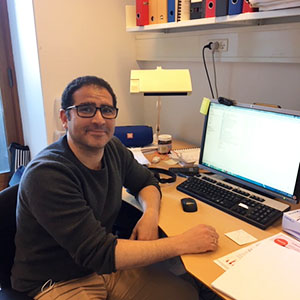Hussam H. Nour-Eldin receives grant from the NNF
Partner in DynaMo Center Hussam H. Nour Eldin has received 3 million DKK to break the yield barrier in microalgae cultivation.

Partner in DynaMo Center of Excellence Associate Professor Hussam H. Nour-Eldin has received a grant of 3 million DKK from the Novo Nordic Foundation for his project "Breaking the yield barrier to enable cost-efficient cultivation of microalgae".
The grant is one of the NNF Biotechnology-based synthesis and production research grants. The aim of Hussam’s project is to understand why the model algae C.reinhardtii is unable to grow on external source of sugar and to develop transport engineering technology strategies for trophic conversion of C.reinhardtii to explore high-yielding cultivation on sugar.
Long-term value
Microalgae are typically praised for their ability to grow without added carbon sources using sunlight to capture CO2. However, due to self-shading, phototrophic cultivation is inherently incompatible with high density cultivation. For cultivation of conventional industrial microorganisms such as E.coli and yeast, sugar is typically used as external carbon source and is proven to be compatible with high-density cultivation. Unfortunately, many microalgae are not able to use external sugar for growth. In this project we would like to understand why and subsequently use this knowledge to generate a strategy for enabling growth on external sugar. By doing so it will be possible to explore whether sugar based growth can break the yield barrier in microalgae cultivation.
Hussam explains,
"I am very happy that NNF has funded this project. We hope to generate new knowledge and molecular tools that will unleash the potential of eukaryotic microalgae as an industrial microorganism for the production of proteins for food, nutraceuticals and even pharmacological compounds. I expect that the transport engineering tools generated in the project will find broad applicability in synthetic biology approaches trying to engineer compartmentalized biosynthetic pathways in photosynthetic organisms".
Hussam’s project commences 1st of April 2019 and has a duration of three years.
